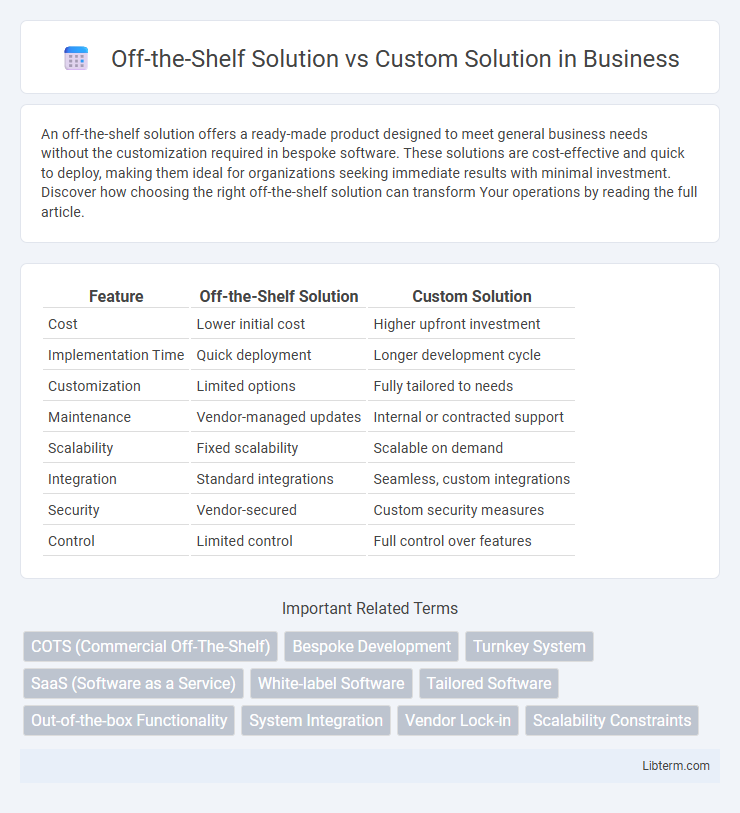An off-the-shelf solution offers a ready-made product designed to meet general business needs without the customization required in bespoke software. These solutions are cost-effective and quick to deploy, making them ideal for organizations seeking immediate results with minimal investment. Discover how choosing the right off-the-shelf solution can transform Your operations by reading the full article.
Table of Comparison
| Feature | Off-the-Shelf Solution | Custom Solution |
|---|---|---|
| Cost | Lower initial cost | Higher upfront investment |
| Implementation Time | Quick deployment | Longer development cycle |
| Customization | Limited options | Fully tailored to needs |
| Maintenance | Vendor-managed updates | Internal or contracted support |
| Scalability | Fixed scalability | Scalable on demand |
| Integration | Standard integrations | Seamless, custom integrations |
| Security | Vendor-secured | Custom security measures |
| Control | Limited control | Full control over features |
Understanding Off-the-Shelf Solutions
Off-the-shelf solutions offer pre-built software products designed to meet common business needs, providing quick deployment and cost savings compared to custom solutions. These products come with standard features and regular updates, making them suitable for companies seeking proven functionality without extensive development time. However, customization options are limited, which might impact the alignment with unique business processes or specific industry requirements.
What Is a Custom Solution?
A custom solution is a tailored software or system designed specifically to meet the unique requirements of a business or user, unlike off-the-shelf solutions that offer generic features for a broad audience. It involves personalized development, allowing integration with existing workflows, scalability, and flexibility to adapt to evolving needs. Custom solutions enhance operational efficiency and competitive advantage by addressing precise business challenges with specialized functionalities.
Key Differences Between Off-the-Shelf and Custom Solutions
Off-the-shelf solutions offer immediate deployment and standardized features designed for general use, while custom solutions provide tailored functionalities specific to an organization's unique requirements. Off-the-shelf software typically involves lower upfront costs but may lack flexibility, whereas custom solutions require higher investment and longer development time to ensure precise alignment with business processes. Scalability and integration capabilities often vary, with custom solutions enabling more seamless compatibility with existing systems compared to the constrained adaptability of off-the-shelf products.
Benefits of Off-the-Shelf Solutions
Off-the-shelf solutions offer immediate deployment and lower upfront costs compared to custom software, making them ideal for businesses seeking quick, cost-effective implementation. These solutions come with established support, regular updates, and tested functionalities that reduce risks associated with development errors. Pre-built integrations and user communities also enhance scalability and ease of use for diverse operational needs.
Advantages of Custom Solutions
Custom solutions offer tailored functionality that precisely aligns with unique business processes, enhancing operational efficiency and user experience. They provide scalability and flexibility, allowing organizations to adapt features as their needs evolve without being constrained by generic software limitations. Investing in custom solutions often leads to competitive advantage by delivering innovative capabilities unattainable through off-the-shelf products.
Limitations of Off-the-Shelf Software
Off-the-shelf software often lacks the flexibility to address unique business processes, leading to inefficiencies and potential workflow disruptions. It may not integrate seamlessly with existing systems, causing compatibility issues and increased IT overhead. Limited customization options restrict the ability to adapt the software to evolving organizational needs, impeding scalability and innovation.
Challenges with Custom Development
Custom software development presents significant challenges, including high costs and extended timelines due to the need for specialized design and coding tailored to unique business requirements. Risk of project overruns, scope creep, and difficulties in accurate initial requirement gathering often lead to delays and increased budget expenditure. Post-deployment, custom solutions may require ongoing maintenance and updates, demanding dedicated technical resources that many organizations find challenging to sustain.
Cost Comparison: Off-the-Shelf vs Custom Solutions
Off-the-shelf solutions typically incur lower upfront costs due to mass production and widespread availability, making them more affordable for immediate deployment. Custom solutions demand higher initial investment, reflecting the expenses of tailored development, integration, and ongoing maintenance aligned with specific business needs. Long-term costs may vary, as off-the-shelf products often require additional customization or licensing fees, while custom solutions provide scalable, optimized performance that can reduce operational expenses over time.
Choosing the Right Solution for Your Business Needs
Selecting the right solution for your business hinges on evaluating off-the-shelf software's quick deployment and cost-effectiveness against the tailored flexibility and scalability of custom solutions. Off-the-shelf options offer reliable, standardized features suitable for common industry requirements, while custom solutions address unique operational challenges and can integrate seamlessly with existing systems. Prioritizing business goals, budget constraints, and long-term growth strategies ensures the chosen software aligns perfectly with your organizational needs.
Future Trends in Software Solutions
Off-the-shelf solutions benefit from rapid deployment and continuous vendor updates, making them ideal for businesses seeking scalable and cost-effective software. Custom solutions offer tailored functionality and integration flexibility, addressing unique organizational needs and enabling advanced innovation. Future trends indicate a growing hybrid approach where companies integrate off-the-shelf platforms with custom modules, leveraging AI-driven automation and cloud-native architectures for enhanced performance and adaptability.
Off-the-Shelf Solution Infographic

 libterm.com
libterm.com